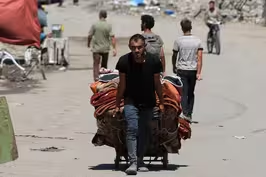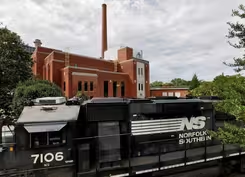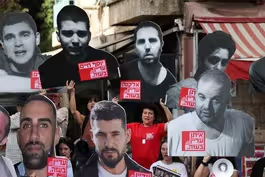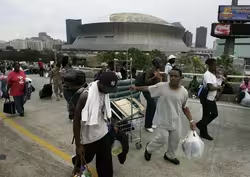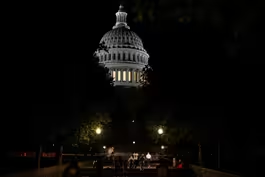
20 years later, a look at the legacy of Hurricane Katrina
Clip: 8/29/2025 | 5m 28sVideo has Closed Captions
20 years later, a look at the legacy of Hurricane Katrina
To discuss how the Gulf Coast has changed in the two decades since Hurricane Katrina, Geoff Bennett spoke with historian Douglas Brinkley. He was a professor at Tulane University in New Orleans in 2005 when Katrina hit, and is the author of "The Great Deluge: Hurricane Katrina, New Orleans and the Mississippi Gulf Coast." He's now a professor at Rice University in Houston.
Problems playing video? | Closed Captioning Feedback
Problems playing video? | Closed Captioning Feedback
Major corporate funding for the PBS News Hour is provided by BDO, BNSF, Consumer Cellular, American Cruise Lines, and Raymond James. Funding for the PBS NewsHour Weekend is provided by...

20 years later, a look at the legacy of Hurricane Katrina
Clip: 8/29/2025 | 5m 28sVideo has Closed Captions
To discuss how the Gulf Coast has changed in the two decades since Hurricane Katrina, Geoff Bennett spoke with historian Douglas Brinkley. He was a professor at Tulane University in New Orleans in 2005 when Katrina hit, and is the author of "The Great Deluge: Hurricane Katrina, New Orleans and the Mississippi Gulf Coast." He's now a professor at Rice University in Houston.
Problems playing video? | Closed Captioning Feedback
How to Watch PBS News Hour
PBS News Hour is available to stream on pbs.org and the free PBS App, available on iPhone, Apple TV, Android TV, Android smartphones, Amazon Fire TV, Amazon Fire Tablet, Roku, Samsung Smart TV, and Vizio.
Providing Support for PBS.org
Learn Moreabout PBS online sponsorshipGEOFF BENNETT: For more on all this, we're joined now by historian Douglas Brinkley.
He was a professor at Tulane University in New Orleans in 2005 when Katrina hit.
And he's the author of "The Great Deluge: Hurricane Katrina, New Orleans, and the Mississippi Gulf Coast."
He's now a professor in humanities in the department of history at Rice University.
Thank you for joining us.
DOUGLAS BRINKLEY, Professor of History, Rice University: Thank you for having me.
GEOFF BENNETT: We just heard the stories of people who lived through Hurricane Katrina 20 years ago.
Hundreds of thousands of people were displaced.
Many never returned.
What is the legacy of that displacement?
DOUGLAS BRINKLEY: Well, it was a diaspora from a region.
It reminds me in history of the Dust Bowl of the 1930s, when people fled Oklahoma and New Mexico, Texas Panhandle for California.
They just had to go somewhere else.
And like the Dust Bowl, Katrina isn't about one date, August 29.
It's really about years, decades that it's taking to heal.
The effects of Katrina are still being felt in the Gulf South area.
Not everybody has been able to come back that wanted to.
And a lot of neighborhoods haven't been able to rebuild for various different reasons.
GEOFF BENNETT: And Katrina, of course, exposed major failures in preparation and response, from the levees to evacuation planning to the federal government's slow reaction at the time.
What do you see as the biggest institutional breakdowns?
DOUGLAS BRINKLEY: Well, the U.S. Army Corps of Engineers built LEGO levees.
And Louisiana hadn't supervised them properly for safety.
It's a city -- the mayor during Hurricane Katrina, Nagin, Mayor Nagin, went to jail.
The current mayor of New Orleans is under corruption charges and -- as I speak.
There's always been a sense of shoddiness that goes on in those parishes.
And this turned deadly.
I mean, the LEGO levees built during the 1960s and beyond proved in 2005 just to be poorly constructed.
So you have those three breaches.
And it turned the city of New Orleans into like a saucer bowl.
Once those broke open, all the water poured to -- into New Orleans, and the below-sea-level neighborhoods were just inundated.
And that led to all sorts of problems, health issues, debris, and then, of course, no electricity on the city for so long.
And anything bad that could happen did seem to happen.
GEOFF BENNETT: And in the immediate aftermath, some questioned whether New Orleans should have been rebuilt at all.
Looking back with the long lens, what did we get right and what could have been done better?
DOUGLAS BRINKLEY: It's a great question.
Well, what we got right is to save and defend New Orleans.
There is no United States of America without that important city.
It was -- meant everything to us.
And just think of the arts and culture alone with Louis Armstrong and the birth of modern jazz or playwriting Tennessee Williams or Lillian Hellman.
And the list is long and it's a deep, rich cultural history.
People all over the world love New Orleans.
It may be our most loved American city.
What we got wrong is, it was built in part below sea level, but it means we have to defend it.
And back 20 years ago and even now, we still turn to the Dutch, look how to build better dams, better levee systems.
I believe the Army Corps of Engineers this time around has built durable levees, but you never know what's going to happen.
There's a fear factor, if a Category 4 or 5 storm comes to New Orleans, because Louisiana is losing all of its wetlands.
And every storm that comes, that power of the surge is getting closer to the city of New Orleans.
So being there is like living on the edge, sort of like Key West.
You just feel that life's good, but at any hurricane season, the big one can hit, and it might be the one that knocks New Orleans off its feet.
GEOFF BENNETT: Like living on the edge, that's a great way to describe it.
To your mind, what were the key lessons of Hurricane Katrina, and have we as a country really learned them?
DOUGLAS BRINKLEY: New Orleans utterly failed in how to get people out, particularly poor people or elderly people.
For example, when I wrote my book, I couldn't believe how many older people wouldn't leave because they were afraid they wouldn't be able to get their diabetes medicine or wouldn't leave because they're on insulin or wouldn't leave because they had a pet and the buses wouldn't allow them to travel with their dog or cat.
Hence, they stayed.
There were no clear directionals of how to flee.
And, most notoriously, the Superdome, people poured in there.
They didn't have the right water or food, and then the roof caved in.
And then people came to the Convention Center.
And there was -- it was mayhem.
And there were bodies, dead bodies, just laying there in front of it.
All hospitals need to have helicopter facilities on their top.
They have to have generators to stay in business.
You can't deal with a crisis anywhere if hospitals aren't going to be able to function around the clock.
GEOFF BENNETT: Douglas Brinkley, we are grateful to add your voice to our coverage of this anniversary.
Thank you for being with us.
DOUGLAS BRINKLEY: Thank you.
And we have to also remember the people in Mississippi who got hit by the brunt of the storm in towns like Biloxi, and Bay St. Louis, Waveland, and the rest.
GEOFF BENNETT: Indeed.
Brooks and Atkins Stohr on school shooting response
Video has Closed Captions
Clip: 8/29/2025 | 10m 13s | Brooks and Atkins Stohr on the political response to the Minnesota school shooting (10m 13s)
Cindy McCain describes dire conditions after visit to Gaza
Video has Closed Captions
Clip: 8/29/2025 | 6m 32s | WFP's Cindy McCain describes dire conditions after visit to famine-gripped Gaza (6m 32s)
Democrat warns Trump firing challenges integrity of STB
Video has Closed Captions
Clip: 8/29/2025 | 4m 58s | Democrat warns Trump firing challenges integrity of STB ahead of railway merger decision (4m 58s)
Israeli frustrations rise as war and hostages remain in Gaza
Video has Closed Captions
Clip: 8/29/2025 | 7m 54s | Frustrations rise in Israel as war endures and hostages remain in Gaza (7m 54s)
Katrina victims reflect on how the storm changed their lives
Video has Closed Captions
Clip: 8/29/2025 | 4m 42s | Katrina victims reflect on how the storm changed their lives (4m 42s)
News Wrap: Trump trying to block $5B approved by Congress
Video has Closed Captions
Clip: 8/29/2025 | 6m 32s | News Wrap: Trump trying to block $5B in foreign aid already approved by Congress (6m 32s)
What consumers can expect as de minimis exemption ends
Video has Closed Captions
Clip: 8/29/2025 | 5m 50s | What consumers can expect as de minimis exemption ends (5m 50s)
Providing Support for PBS.org
Learn Moreabout PBS online sponsorshipSupport for PBS provided by:
Major corporate funding for the PBS News Hour is provided by BDO, BNSF, Consumer Cellular, American Cruise Lines, and Raymond James. Funding for the PBS NewsHour Weekend is provided by...

